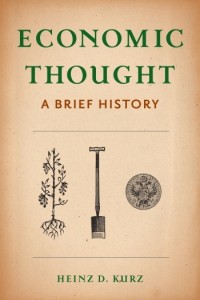This weekend my reading was [amazon_link id=”0231172583″ target=”_blank” ]Economic Thought: A Brief History[/amazon_link] by Heinz Kurz. It really is brief, just 183 pages, starting with the Ancient Greeks and ending with behavioural economics and RCTs. So it sets out the broadest outlines of economics, with a strong bias towards macroeconomics and thinking about economic systems. Marxism is covered – indeed, gets a whole chapter of 14 pages – but industrial organisation is absent save for a bit of Schumpeter and a bit of new institutional economics.

Within its self-imposed limitations of space and selectivity, the book does a decent job in outlining the key features of, say, classical thought and the marginalist turn – for example, Kurz emphasises the introduction of the emphasis on the flow of commodities produced each year in classical thinking. I learned a few new names: Hermann Heinrich Gossen, anyone? I hadn’t heard of him before, but learn here that he introduced the earliest version of marginal utility theory. I thought the discussion of utility theory is particularly good. Kurz writes:
“Compared with cardinal utility theory, ordinal utility theory – with its rejection of interpersonal comparisons – dramatically privileges the individual relative to society. In this perspective, the individual, one might say, is in principle attributed a right to veto public decisions that affetc his or her (subjective) well-being … As a consequence, economic policy seems unable to improve social situations. Since every policy alternative has some gainers and som losers, how could one ever judge the gains of the former against the losses of the latter, if interpersonal utility comparisons are prohibited?”
Very clear. There are a couple of other points where Kurz highlights interesting and deep methodological issues – another one, for instance, critiques Heckher-Ohlin-Samuelson in terms of its assumption of a single homogeneous ‘quantity of capital’. And in a short section on economic geography, there’s the point that in a constant returns to scale world assumed by so much of economics (including productivity accounting), “economic activity will be evenly distributed across a homogeneous plain, carried out by autarkic units of production and consumption.”
So, some nice insights. I did find myself wondering what audience the author had in mind as he wrote. He tries to explain some concepts – indifference curves, Keynesian aggregate demand, Hicks-Kaldor compensation and Skitovsky’s rebuttal – in a couple of pages at most. Economists reading this book wouldn’t need the explainers. Normal people reading it will find these far too condensed and impenetrable. As one of the former group, I’d have traded off the attempts at explanation of basic concepts for some more of Kurz’s critique of the ideas he is covering. Still, this would be a useful book for students just starting to get into the history of thought – one step beyond [amazon_link id=”0140290060″ target=”_blank” ]The Worldly Philosophers[/amazon_link], and a prelude to a bigger book like Saadmo’s excellent [amazon_link id=”B00HRFGZ7I” target=”_blank” ]Economics Evolving[/amazon_link].
[amazon_image id=”067163318X” link=”true” target=”_blank” size=”medium” ]The Worldly Philosophers: The Lives, Times, and Ideas of the Great Economic Thinkers (A Touchstone book)[/amazon_image] [amazon_image id=”B00HRFGZ7I” link=”true” target=”_blank” size=”medium” ]Economics Evolving: A History of Economic Thought by Sandmo. Agnar ( 2010 ) Paperback[/amazon_image]

You might be surprised how many economists and related never had a proper grounding in economic thought. We did not all go to Cambridge or the like and red bricks universities were and are variable in quality and most important of all, depending on your age, certain economic thought may have been suppressed because to did not mesh with the current fashion of the day that the economics sometimes get infected by .
Now I write this I think the point can be made stronger . All non-academic economists can have a worthwhile and productive career( or second careers in other) and might like when slowing in later life t catch up on what they missed. without know all of the history of academic thought. This book is a must for me.
Fair point. In fact, I think very few economists have a grounding in economic thought. I was trying to say a bit less on what indifference curves are and a bit more about the thought would be a worthwhile trade-off in a very short book. I hope you enjoy it!
was surprised you didn’t know about Gossen, but a quick comparison between the German (https://de.wikipedia.org/wiki/Gossensches_Gesetz) and the English wikipedia page (https://en.wikipedia.org/wiki/Gossen%27s_laws) explains a lot.
In Germany the laws are usually being taught in Microeconomics 101 in your first semester.
One of many interesting differences between German and Anglo American economics!
Diane, while I alos like the Heilbroner classic and the book by Sadmo, i I think the best introduction to economic thought is the out-of-print Evolution of Modern Economics by Richard Gill . Though an old book (published in the late 60’s.) it is still worth reading. Aimed at the general reader, it is rigorous enough for the undergrad students too . It is far more brief than the Kurz volume and can be read in one sitting. If you have not read it I urge you to on one of your journeys or on a lazy afternoon.
I don’t know that one so thanks for the recommendation. I’ll have to track it down.
Gossen is mentioned quite prominently in the Sandmo book.
An interesting post would be one where you compare your thoughts on different Histories of Economic Thought – Sandmo, Screpanti, Hunt and Lautzenheiser etc.